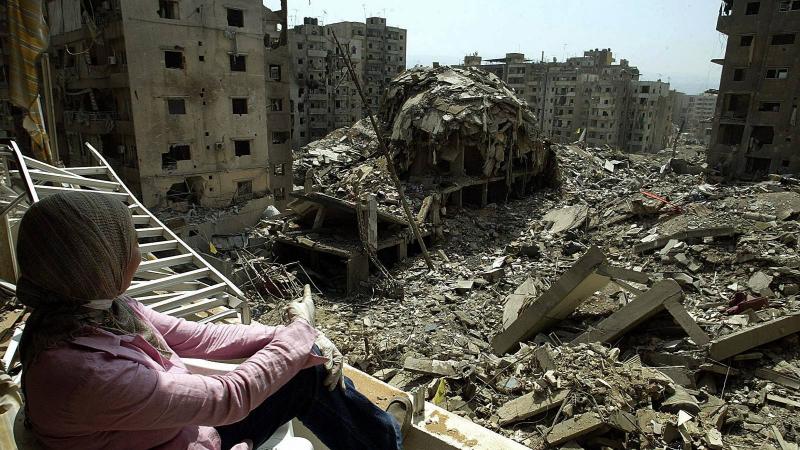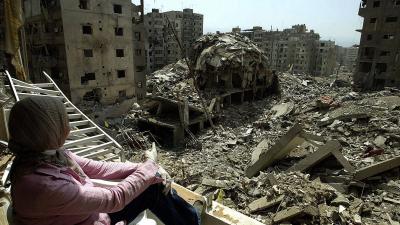The Secretary-General of the Lebanese "Hezbollah" party, Hassan Nasrallah, affirmed that the town of Ghajar, the Shebaa Farms, and the Kfarshouba hills will inevitably return to Lebanon, warning against the dangers of the proposed New Middle East project, which collapsed due to the resistance imposing a deterrent equation. On the Lebanese front, he called for dialogue that can only occur on the basis of mutual understanding among the parties, asserting that Sleiman Franjieh is the party's candidate as he is a man who "protects the back of the resistance."
For the first time, Nasrallah revealed that the National Movement had reproached him after the events of May 7, regarding the agreement reached in Doha, where he was asked to propose President Michel Aoun's name. However, the party believed that the priority at that time was to extricate the country from the spiral it was in, thus responding that they did not want to gain political capital by imposing a president’s name in an agreement aimed at resolving the issue between the Lebanese government and the party regarding the telecommunications issue. Later, in Lebanon, the party endorsed General Aoun's name and supported him for more than two and a half years until he reached the presidency.
Regarding the New Middle East and deterrence, Nasrallah viewed that if the New Middle East project were to succeed, it would lead to the loss of Palestine, the Golan Heights, and whatever remains of Lebanon under occupation, and would entrench Israel as an absolute power in the region. But the project failed in Lebanon and continued to be dismantled in Palestine, Iraq, Syria, and Iran.
Concerning Ghajar and southern Lebanon, Nasrallah noted that "the incident that occurred today is still under investigation and comprises more than one incident. Our role previously was that we monitored the borders under the responsibility of the state and the army with UNIFIL supervision since 2006. With each violation, we filed a complaint, so we decided to activate air defense. The Israeli admits he is now constrained in Lebanese airspace, and sometimes bombed Syria from Lebanon. These documented violations number in the thousands, and no one in the world has moved. However, since last year, the Israeli has started to erect barbed wire to seize the Lebanese part of Ghajar. Moreover, they brought in over 200,000 tourists to tell them it is Israeli land. The idea of setting up tents was to shed light on what happened in Ghajar. We also remember the difficult negotiations Lebanon faced regarding its maritime borders. Today, because there is a tent in Lebanese land, the Israeli reacted, considering the Shebaa Farms as Israeli territory. The irony here is that the Israeli can no longer occupy Lebanon through a musical band; the equation has changed, and the youths of the resistance have directives to act if there is an assault on the erected tent."
He emphasized that "there is no such thing as maritime border demarcation; everything has been defined since the 1920s, before the establishment of the occupying entity. Lebanon knows its borders, and what is happening is not border demarcation but points where the international community should pressure Israel to withdraw and reclaim." Regarding Ghajar, he stated, "There are political forces that call themselves sovereign, silent on the violations of Ghajar. This town must return unconditionally, and it is the state's responsibility." He confirmed, "Through integration and cooperation, we will regain Ghajar, as is the case with the Shebaa Farms. There is no interest for Lebanon in turning the resistance into a formal institution directly affiliated with the state."
He said, "The value of the tent is to open this discussion about regaining our lands wide open. We are a group with a goal."
On the subject of the presidency, Nasrallah stated: "The duo has been accused of bargaining to push towards a vacuum because it seeks to reconsider sectarian shares and eliminate parity, while those who claim to be 'sovereign' seek to change the country's composition. The notion that Hezbollah wants to abolish the Taif Agreement and parity is a lie, and there are those working to escalate tensions in Lebanon." He affirmed that Hezbollah "will not exploit its power to impose political choices on the Lebanese, and the weapon of the resistance is for the defense of Lebanon." He said, "The true guarantee we request is the person of the president whom we know for his patriotism. The person is the guarantee. For us, the person is fundamental. In the July war, there was a sharp political divide, and at that time Emil Lahoud was our guarantee, as was President Michel Aoun. Regarding the nomination of Sleiman Franjieh, all we care about is that he is honest, loyal, courageous, and qualified to be president." He noted, "It is possible to bring in an economist and a knowledgeable person but lacking support."
On the topic of dialogue, Nasrallah confirmed that "our position on dialogue is well-known; we are ready without conditions, and there is no solution in Lebanon—neither federalism nor division is the solution—this country’s existence and survival depend on the state, state institutions, and dialogue among the Lebanese. We do not want to take anything from anyone, and there is no solution for electing a president except through dialogue among the Lebanese parties." He added, "I tell the Lebanese they should draw lessons from everything happening around us; division and federalism are not a solution but a project for a civil war." He said, "In the agreement that occurred after May 7, the National Movement expressed sadness that we did not propose General Michel Aoun’s name, and our response was that we do not propose names but rather address problems. After the problem was resolved, we adopted President Aoun’s name and supported him for two and a half years."
Regarding the deterrence force, he explained: "The aim of the July aggression was to crush the resistance, but it established a deterrent equation. Peace and security in southern Lebanon are the result of people's confidence in the effectiveness of deterrence."
He pointed out that "the peoples of the region should demand that their governments take a firmer stance regarding the burning of the Holy Quran," praising Russia's notable position on the holy book's burning, which embarrassed the West. He noted that "the person who burned the Quran has connections with Mossad, and his goal is to sow discord between Muslims and Christians."
On Jenin, he stated: "The Israelis' objective in Jenin was to establish a deterrent equation, but they failed, and the resistance continued."
Nasrallah's remarks came on the occasion of the 17th anniversary of the July 2006 war with Israel. The July 2006 war was the last direct confrontation between Israel and Hezbollah. This confrontation began on July 12 and lasted for 34 days, resulting in the deaths of approximately 1,200 Lebanese and more than 120 Israelis, causing widespread material destruction in Lebanon.




